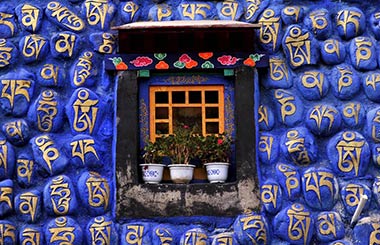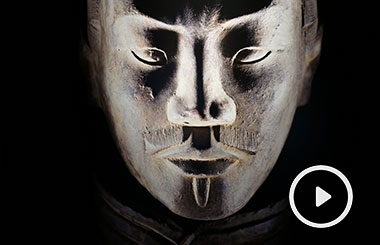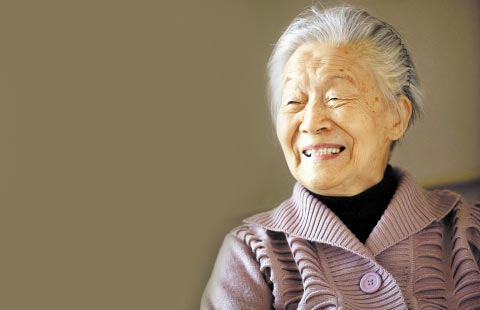Exquisite work inspired by Buddha draws many to HK mall
By Wang Yuke ( China Daily ) Updated: 2016-06-07 08:13:35
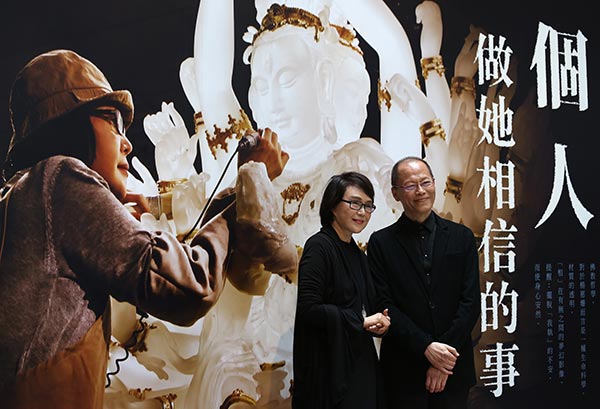 |
|
Loretta H. Yang and her husband, Chang Yi, are displaying a sculpture of the Guanyin bodhisattva in a shopping mall in Hong Kong. [Photo provided to China Daily] |
The 2-meter-high piece, which together has 1,000 arms and eyes, was made using liuli, a kind of ancient glass. It was designed by Loretta H. Yang, an award-winning Taiwan actress who founded Liuli Gongfang, a contemporary glass studio, along with her husband, Chang Yi, a former film director.
The exquisite craft at the Festival Walk mall is the artistic interpretation of life and goodness, Yang says.
Guanyin is also an inner strength that people can experience when faced with difficulties or while helping others in need, Yang says, describing the concept in Chinese culture.
It inspired her to create the artwork.
"I intended to use the positive image of Guanyin to enlighten the public to do good deeds. It doesn't have to be a big deed. You only need to do your bit within your ability to help anyone who is in trouble," says Yang.
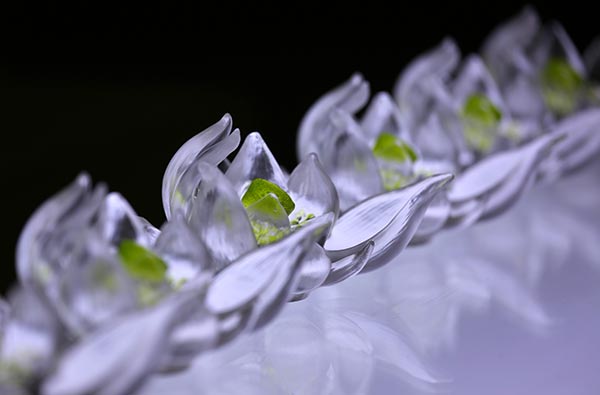 |
|
A crystal sculpture of the Guanyin bodhisattva, or Goddess of Mercy, has become an instant draw at a Hong Kong mall, where shoppers are stopping in their tracks to stare at its intricacy. [Photo provided to China Daily] |
She believes if everyone puts self-interest aside, people will become more generous and society will be more united.
"Liuli is a material that is both beautiful and fragile. Our life is just like it, isn't it?
"I want this liuli sculpture to communicate a message that life is limited and brittle in order to remind people of living in the present and being grateful," she says.
Her husband, Chang, says Liuli Gongfang is more of a nonprofit.
"Before each creation, we ask ourselves: 'Will it do anything good to society?'" says Chang.
The majestic sculpture is far from simple. It cost Yang and Chang 20 million yuan ($3 million) and took five years. It involved 100 artisans and four tons of fire-resistant gypsum and liuli.
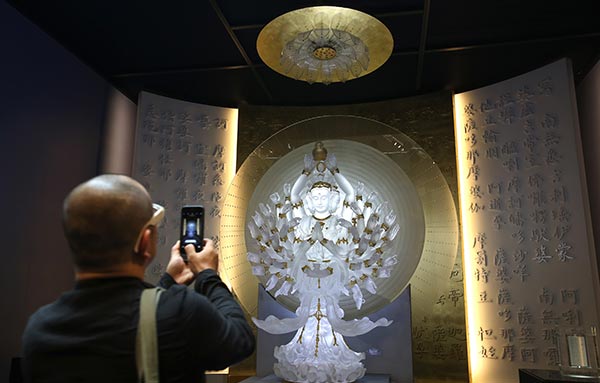 |
|
A crystal sculpture of the Guanyin bodhisattva, or Goddess of Mercy, has become an instant draw at a Hong Kong mall, where shoppers are stopping in their tracks to stare at its intricacy. [Photo provided to China Daily] |
The whole creation process-from crafting the model, covering it with a silicon mold, filling a wax mold, releasing the wax, casting fire-resistant gypsum, baking it in the kiln, cooling and polishing-was full of challenges. The 6-meter-tall kiln is also stunning.
The craftsmanship to make this kind of crystal glass is called pate de verre in French. Yang picked up the skill in France before it dawned on her that the technique has its roots in China, dating back to the Han Dynasty (206 BC-AD 220). It was then that the couple felt compelled to revitalize the Chinese art.
They chose the mall as the setting for the exhibition with the intention of exposing as many people as possible to the mindset that "doing somebody a favor with no conditions attached" is a good thing, as Buddhism teaches.
Yang encourages everybody, no matter their faith, to make good deeds a daily routine.
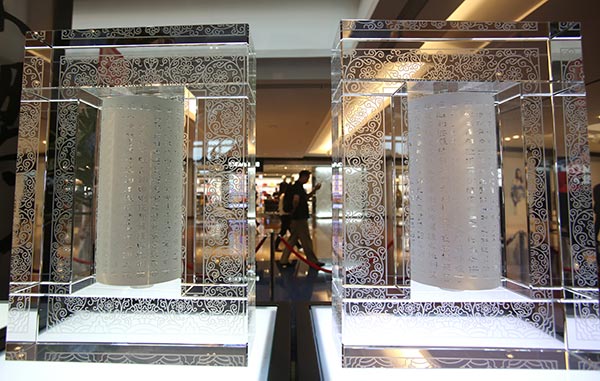 |
|
A crystal sculpture of the Guanyin bodhisattva, or Goddess of Mercy, has become an instant draw at a Hong Kong mall, where shoppers are stopping in their tracks to stare at its intricacy. [Photo provided to China Daily] |
The couple wanted the sculpture to be viewed widely by the public rather than restrict it to an exhibition for connoisseurs.
Yang discovered her bond with Guanyin and Buddhism in 1996 when she embarked on a journey along the ancient Silk Road. During her stay in Dunhuang, Yang was deeply touched by the murals-A Thousand Hands and A Thousand Eyes Bodhisattva (Guanyin)-in the Mogao Caves.
Marveling at the exquisite portrayal while regretting the peeling paint that blurred the image of Guanyin over time, Yang resolved to re-create the painting in a three-dimensional form.
She felt it would be a shame if the artistic legacy of predecessors was forgotten.
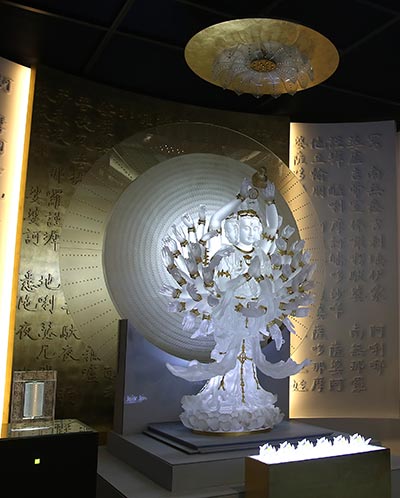 |
|
A crystal sculpture of the Guanyin bodhisattva, or Goddess of Mercy, has become an instant draw at a Hong Kong mall, where shoppers are stopping in their tracks to stare at its intricacy. [Photo provided to China Daily] |
She began her work in 1999. Unfortunately, the disastrous earthquake in Taiwan in September that year turned her clay model into rubble.
In May 2000, a 1.6-meter-tall sculpture of Guanyin was completed and transferred to the Dunhuang Research Academy.
Six years later, the 1-meter-tall liuli sculpture of Thousand Arms, Thousand Eyes, Possessing the Knowledge of Sorrow was completed, which marked the first liuli-made 3-D rendition of the Guanyin mural.
Yang's work has been collected by more than 20 internationally renowned museums, including the Victoria and Albert Museum in London, the Corning Museum of Glass in New York and Bower's Museum in California.
Related:
Sculpture exhibition on in Shanghai
Rodin sculpture sets new record even as auction market softens
|
|
|
|
|
|
|
|

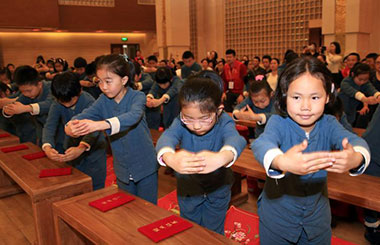
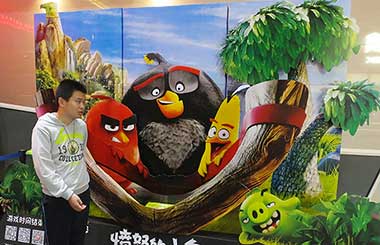
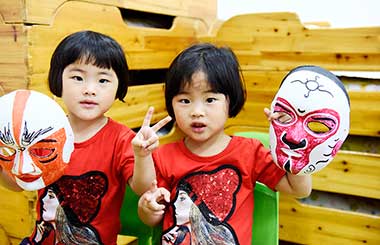
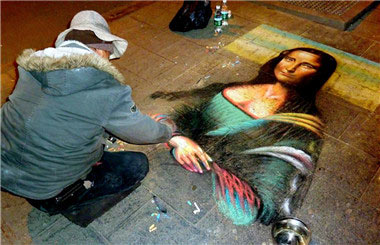
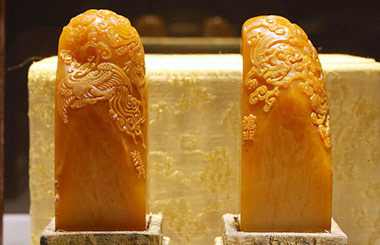

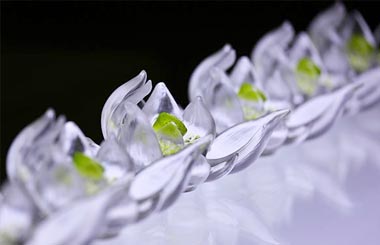
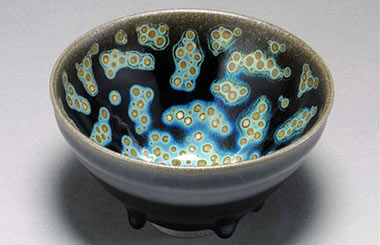
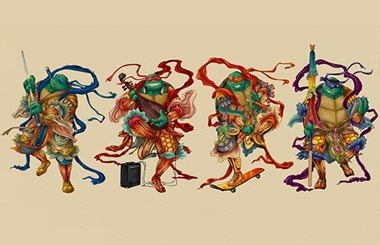



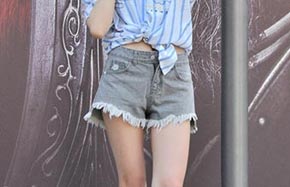
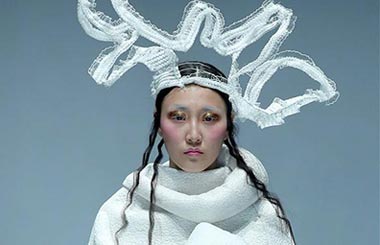





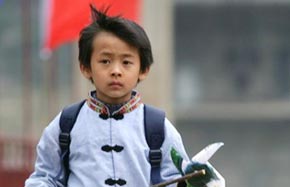


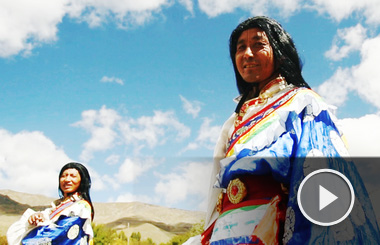
 Raymond Zhou:
Raymond Zhou: Pauline D Loh:
Pauline D Loh: Hot Pot
Hot Pot Eco China
Eco China China Dream
China Dream China Face
China Face
